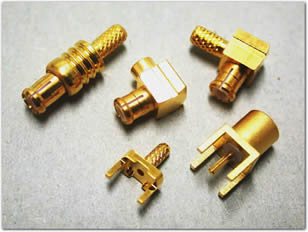 Prev
:: Top ::
Next Prev
:: Top ::
Next
|
| Broadband performance with low reflection DC to 6 GHz. Low cost combined with high quality. |
| Quick connect/disconnect snap-on mating reduces installation time. |
|
Accommodates a wide range of miniature RG flexible coaxial cables, including semi-rigid cable. This provides
customer flexibility in their design and manufacturing.
|
| Automotive |
Base Station |
Components |
| GPS |
Head End Equipment |
Instrumentation |
| PC/LAN |
Radios |
Telecom |
| WLAN |
Wireless/Networks Antenna |
|
| Impedance |
50 Ω |
| Frequency Range |
0-6 GHz |
| Voltage Rating |
335 VRMS |
| Dielectric Withstanding Voltage |
1,000 volts |
| VSWR |
Straight connectors: 1.00 @ 2.5 GHz; Right angle connectors: 1.10 @ 2.5 GHz |
| Contact Resistance |
Center contact: 5 mΩ Outer contact: 1.0 mΩ |
| Insulation Resistance |
5,000 mΩ minimum |
| Insertion Loss |
0.10 dB @ 1 GHz |
| Mating |
Snap-on coupling per CECC 22220 |
| Braid/Jacket Cable Affixment |
Hex crimp |
| Center Conductor Cable Affixment |
Solder |
| Contact Captivation |
All types unless noted otherwise |
| Engagement Forces |
Engagement: 4.5 lbs (20N) maximum; Disengagement: 2.3 lbs (10N) minimum |
| Connector Durability |
500 mating cycles minimum |
| Male Contact |
Brass per QQB-626 |
| Female Contact |
Beryllium copper per QQC-530, heat-treated per MIL-H-7199 |
| Contact Plating |
30 u" Gold |
| Body, Metal Parts |
Brass per QQB-626 |
| Body/Metal Parts Finish |
Nickel or Gold |
| Insulator |
PTFE |
| Gasket |
Silicone rubber |
| Crimp Ferrule |
Seamless copper tubing alloy |
| Ferrule Finish |
Nickel or Gold |
| Temperature Range |
- 65°C to +165°C |
| Thermal Shock |
MIL-STD-202 method 107, test condition B (except high temperatures @ 200°C) |
| Shock |
MIL-STD-202 method 213, snap-on, test condition B |
| Vibration |
MIL-STD-202 method 204, snap-on, test condition B |
| Corrosion |
MIL-STD-202 method 101, test condition B. 5% salt solution |
Note: These characteristics are typical but may not apply to all connectors.

 Prev
:: Top ::
Next
Prev
:: Top ::
Next

